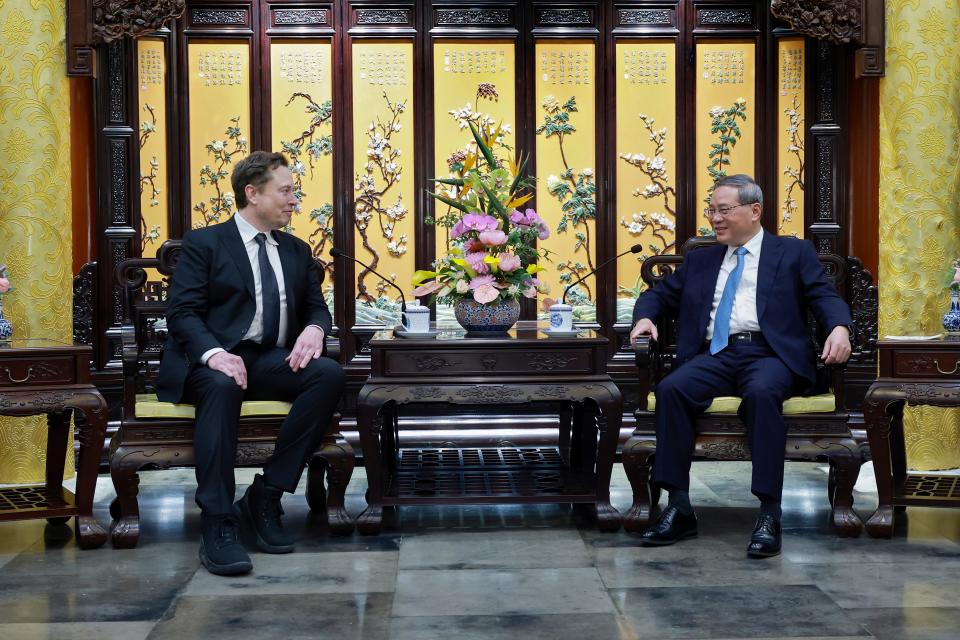Elon Musk is walking a fine line in China with Tesla
- Oops!Something went wrong.Please try again later.
Elon Musk has a lot going on in China right now.
Amid dwindling Tesla sales, he's building closer relations there and putting focus on robotaxis.
It's a move that present a lot of uncertainty for his EV company.
Elon Musk has plenty on the line in China right now.
A global slowdown in demand for Teslas has been exacerbated in the country, where consumers have been presented with a parade of electric vehicles from domestic rivals like BYD and Xiaomi at a time when they're watching their spending.
China is Tesla's biggest market outside the US, which means dwindling interest has had a clear knock-on effect.
The company delivered about 387,000 vehicles in the first three months of the year, marking a 20% drop from its previous quarter. Tesla's earnings last month also raised concerns, as it reported a nearly 9% year-on-year drop in quarterly revenue to $21.3 billion.
So Musk's response in recent weeks — a seeming boost in focus on the Far East — is at least grounded in some logic.
A trip to Beijing last month to meet China's premier, Li Qiang, came along with news that the billionaire had managed to pull off a huge deal for Tesla to partner with Chinese internet giant Baidu on robotaxis.

The deal, which has been reported to give Tesla access to mapping and navigation software that supports full self-driving (FSD) cars, has clearly helped. Tesla's stock jumped 15% following news of a tie-up that supports Musk's fresh focus on autonomy.
It's a move that Musk now seems intent on doubling down on.
According to a Reuters report on Friday, Tesla is seeking to build a data center in China that could be used "to train the algorithm needed for more fully autonomous vehicles."
Musk's reasons for doing this are getting clearer. As the billionaire recently wrote on X, "Going balls to the wall for autonomy is a blindingly obvious move. Everything else is like variations on a horse carriage."
Not quite betting the company, but going balls to the wall for autonomy is a blindingly obvious move.
Everything else is like variations on a horse carriage.— Elon Musk (@elonmusk) April 16, 2024
But in heading in this direction, Musk risks walking a fine line.
For one, self-driving technology has proven tricky to produce at a global scale. One of Tesla's main challenges is the brutal price war it's waging with Chinese competitors that are trying to win buyers with cheaper vehicles.
But by prioritizing a lofty goal of millions of self-driving Teslas cruising streets worldwide, Musk pursues a high-risk bet that might only pay off in the distant future.
Using China as a test bed for self-driving technology may spark anxieties in Washington, too. Competent FSD capabilities for Teslas globally could depend on using quality data transferred between the US and China — a complex proposition during times of heightened tensions.
Tesla has not shared any details about the reported tie-up, let alone how it would manage the security fears that could be triggered if Beijing gets oversight of the data being fed into its vehicles in the name of FSD.
What many investors have pleaded for instead is the long-awaited, sub-$30,000 Tesla model Musk has previously talked about as a means of opening up Tesla to the mass market.
Indeed analysts at Wedbush last month said it's "crucial" that Tesla delivers a more affordable model in the next 18 months, calling a pivot to robotaxis a "risky gamble."
But with China seemingly at the top of Musk's mind, Tesla is driving into an uncertain future.
Read the original article on Business Insider

